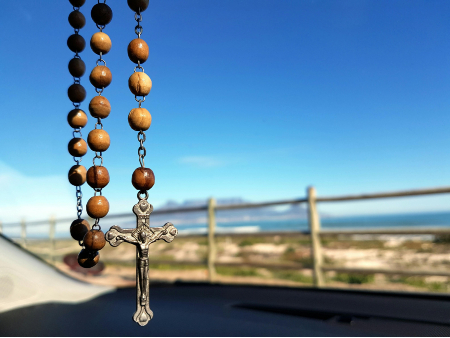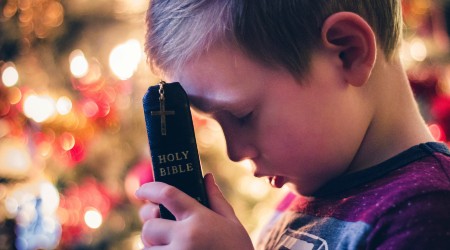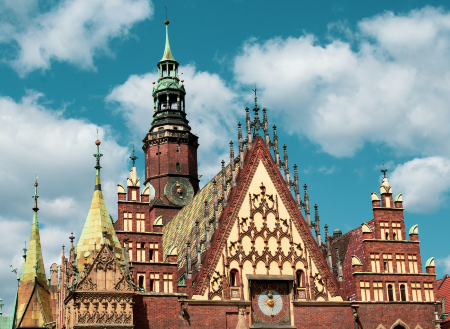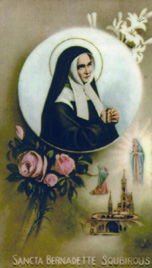 Hi readers, it seems you use Catholic Online a lot; that's great! It's a little awkward to ask, but we need your help. If you have already donated, we sincerely thank you. We're not salespeople, but we depend on donations averaging $14.76 and fewer than 1% of readers give. If you donate just $5.00, the price of your coffee, Catholic Online School could keep thriving. Thank you. Help Now >
Hi readers, it seems you use Catholic Online a lot; that's great! It's a little awkward to ask, but we need your help. If you have already donated, we sincerely thank you. We're not salespeople, but we depend on donations averaging $14.76 and fewer than 1% of readers give. If you donate just $5.00, the price of your coffee, Catholic Online School could keep thriving. Thank you. Help Now >
The Catholic Church's Unique Role in Sudan and in the West
FREE Catholic Classes
We hear so many negative things about our Church, but they are not true. Rather, the Catholic Church is just the opposite! The Church is not only the font of God's grace and spiritual blessings, it is uniquely qualified to help build civilizations. We can see this if we look at the Church's remarkable role in Sudan and in the West.
Highlights
Catholic Online (https://www.catholic.org)
7/11/2011 (1 decade ago)
Published in Africa
Keywords: Sudan, Independence, July 9, Western civilization, History, Catholic Church, Priesthood, Michael Terheyden
P>KNOXVILLE, TN (Catholic Online) - We hear so many negative things about our Church: that the Church interferes with change and progress; that it is against science and breeds ignorance; that it kept the West mired in the Dark Ages; that it is intolerant, oppressive and causes wars. But what we hear is not true. Rather, the Church is just the opposite! The Church is not only the font of God's grace and spiritual blessings, it is uniquely qualified to help build civilizations.
The historic events happening in the African nation of Sudan exemplify the Church's unique giftedness. Although it is possible for war to break out again in this country, we can still be proud of the Church's efforts to help Southern Sudan achieve independence. But such accomplishments are nothing new for the Church. The Church played an even greater role in the building of Western Civilization. Perhaps we can see the true Church for ourselves if we take a brief look at these two remarkable examples.
Sudan is the largest country in Africa. It is bordered by Egypt in the north and the Red Sea in the northeast and eight other countries. The Nile River runs the vertical length of its interior, which mostly consists of vast plains and desert areas in the North and spotted mountain ranges in the South. Sudan is one of the most geographically diverse countries on the continent.
Although Arabic and English are considered the official literary languages of Sudan, the Sudanese people speak about 134 different languages. Arabic is the most popular, especially in the North, and about a dozen languages dominate the South. The Sudanese are mostly Arab Muslims in the North. The South consists of mostly non-Arabic tribes. These tribes generally practice traditional native religions or Christianity.
Sudan was jointly controlled by Great Britain and Egypt until 1956. Since that time, the North has wanted to control the South because of its abundant natural resources. As a result, there has been much armed conflict. Two civil wars have cost the lives of an estimated 2.5 million people. Conflict continues in the western region known as Darfur and has displaced hundreds of thousands of people.
However, the civil war between the North and the South came to an end in 2005. And as part of the peace agreement, a referendum for the independence of the South was held in January and approved. On July 9, 2011, Sudan will split into two nations, and the Southern Sudanese will celebrate their first Independence Day. On that day, Southern Sudan will become the newest nation on the African continent.
Serious hurdles and risks remain going forward, but whatever happens, this nation would not have gotten to this point if it wasn't for the role played by the Church. The Church led the way. It did not do so out of self interest, but out of a sense of responsibility and love for God and the people. It did not try to sway the referendum one way or the other, but it was extremely instrumental in paving the way for the referendum to take place. Benjamin Mann at the Catholic News Agency has given us some of the details.
For instance, the Church provided a vision for the people and talked about a future Sudan before it existed. The Church helped the Southern Sudanese believe that they could pursue self-determination non-violently, and it encouraged the people to participate in the building of their future nation. It also helped voters understand the implications and consequences of their decision. Then it worked to ensure that the referendum took place peacefully, fairly and on schedule, without igniting old conflicts.
The Church also prepared for multiple contingencies. Using its networks, it set up conflict mitigation and peace training. The Sudanese bishops have also sought guarantees for the security and rights of more than 1.5 million non-Muslim people living in the North. And it collaborated with the Southern government and agencies like Caritas and Catholic Relief Services to deal with mass migrations from the North into the South, which are expected to put a tremendous strain on the new nation.
The Church is also expected to play an extremely important role in the South after July 9th. The Church is trusted by the people. It is also seen as the last vestige of civil society in areas where there is extreme poverty, illiteracy, a lack of infrastructure, weak local government, and corruption. In such areas, the Church can often communicate and work across ethnic and geographical boundaries more effectively than the government can at present. Until a strong and healthy civil society emerges in Southern Sudan, the Church will be compelled to play a leadership role in this budding nation.
The beautiful and inspiring example we see today between the Church and the people of Sudan reminds us of another time when lives were in great turmoil, and the Church, out of a sense of responsibility and love for God and the people, was compelled to play a leadership role. In an article titled "Priesthood" and published in The Catholic Encyclopedia, J. Pohle reminds us how the church gave the world religion, morality, science, art, and industry after Rome fell and helped build the greatest civilization in history. The following synopsis is from part four of Mr. Pohle's article.
Charlemagne is credited with uniting the German hordes into one nation after the fall of Rome, but it was Catholic missionaries and martyrs who paved the way for Charlemagne's success. They converted many of the Germanic peoples and helped raise them out of a state of savagery, considered barbaric even for those times. In later times, the Benedictines, Cistercians, Franciscans, Dominicans, Jesuits, and others spread across Europe and around the world raising the level of morality and civilization.
The Church raised the level of morality and civilization by serving the people's needs and promoting human dignity. For instance, the maxim, "Education for all," was first uttered by Pope Innocent III. During the Middle Ages, universities and elementary schools were run by priests and religious. The first medical facility in Europe, the School of Salerno, was founded by the Benedictines. They educated skilled physicians for all Europe.
Furthermore, it has been said that St. Vincent de Paul achieved more for the sick and the poor than many cities and states combined. More recently, Cardinal Lavigerie played an important role in the abolition of slavery, and Catholic congregations, such as the Trinitarians and the Mercedarians, devoted themselves to the liberation of slaves in pagan and Muslim lands.
The Church also played an important role in science, the humanities and scholarship. The idea of scientific progress is of Catholic origin. The scientist and philosopher Roger Bacon was a Franciscan friar. The Heliocentric theory of the solar system is attributed to the Catholic cleric Copernicus. The first geographical chart of the world is attributed to Fra Mauro of Venice.
Early humanism was strongly supported by Popes Nicholas V and Leo X. The humanist scholar and writer Erasmus was a priest. Lope de Vega and Calderon, both priests, are a couple of Spain's greatest writers. The foundation of historical criticism was laid by Cardinal Baronius, the monks of St. Maur, and the Bollandists. And a Jesuit is the "father" of comparative philology, that is, the scientific approach to the study of language in texts.
Social service and higher learning are not the only secular contributions of the Church. An advanced civilization cannot exist without a sound economic base and infrastructure to support it. Catholic bishops and priests, such as Duns Scotus, Nicholas Oresme, Bishop of Lisieux, St. Antoninus of Florence, and Gabriel Biel, laid the foundation for national economies. Benedictine, Cistercian, and Trappist monks cleared the forests and cultivated the land, rendering vast areas free from fever. They also engineered and built drainage systems, irrigation systems, roads, and bridges.
Based on this synopsis, we can see that the Church is made up of humble men and women of faith, many of whom God endowed with the intellect, skill, and courage to help build the greatest civilization in history. Moreover, the Church today, despite the failings and sins of some of its members, is the same Church that helped build Western civilization and raise the level of so many others over the past two thousand years, including Sudan today.
When I look at the role of the Church in Sudan, I am hopeful for the Sudanese and pray for peace and prosperity in their country. When I look at the Church in Sudan and throughout Western history, I know that the negative things we hear about our Church are not true. I also know that the Church is uniquely gifted to help build civilizations, and it makes me proud of my Catholic heritage.
-----
Michael Terheyden was born into a Catholic family, but that is not why he is a Catholic. He is a Catholic because he believes that truth is real, that it is beautiful and good, and that the fullness of truth is in the Catholic Church. However, he knows that God's grace operating throughout his life is the main reason he is a Catholic. He is greatly blessed to share his faith and his life with his beautiful wife, Dorothy. They have four grown children and three grandchildren.
-----
---
'Help Give every Student and Teacher FREE resources for a world-class Moral Catholic Education'
Copyright 2021 - Distributed by Catholic Online










 Daily Readings for Tuesday, April 16, 2024
Daily Readings for Tuesday, April 16, 2024 St. Bernadette: Saint of the Day for Tuesday, April 16, 2024
St. Bernadette: Saint of the Day for Tuesday, April 16, 2024 Prayer for our Family #1: Prayer of the Day for Tuesday, April 16, 2024
Prayer for our Family #1: Prayer of the Day for Tuesday, April 16, 2024

